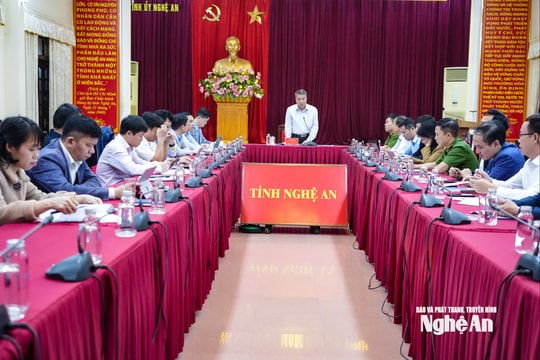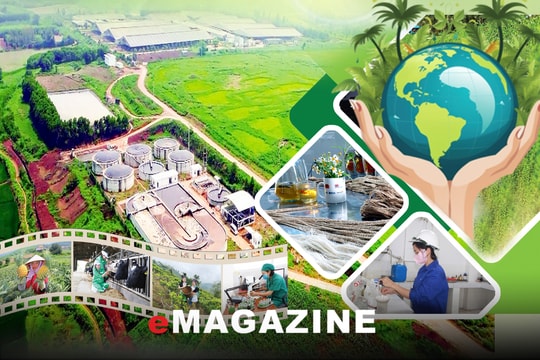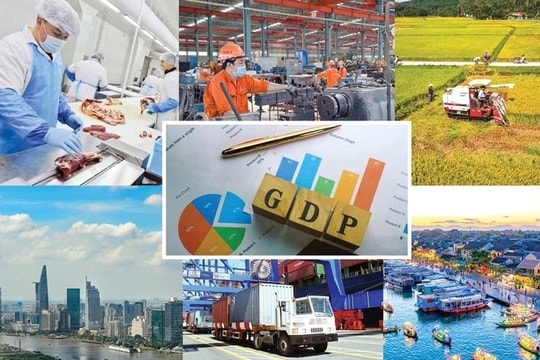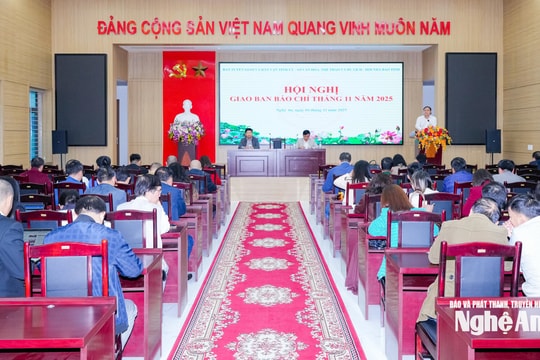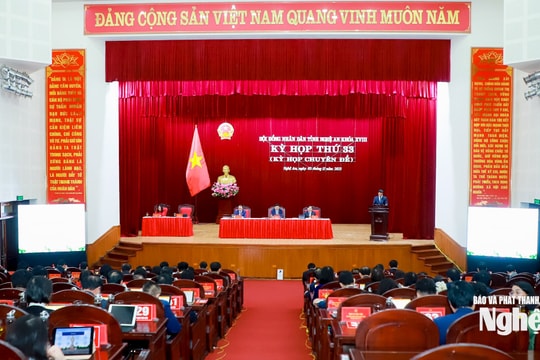Full text of General Secretary Nguyen Phu Trong's speech opening the 5th Central Conference
General Secretary Nguyen Phu Trong delivered the opening speech of the 5th Central Conference with many important contents. Nghe An Newspaper would like to introduce the full text of this speech.
Dear Central Committee,
Dear Conference attendees,
Implementing the full-term working program, today the 13th Party Central Committee began its fifth meeting to discuss, comment and decide on the following contents: (1) Summarizing 10 years of implementing the Resolution of the 6th Central Conference, 11th tenure, on continuing to innovate land policies and laws in the period of comprehensively promoting the renovation process. (2) Summarizing 15 years of implementing the Resolution of the 7th Central Conference, 10th tenure, on agriculture, farmers and rural areas. (3) Summarizing 20 years of implementing the Resolution of the 5th Central Conference, 9th tenure, on continuing to innovate, develop and improve the efficiency of the collective economy. (4) Project on building grassroots party organizations and party members. (5) Project on establishing a provincial-level Steering Committee on preventing and combating corruption and negativity. (6) Report on reviewing the leadership and direction of the Politburo and Secretariat in 2021; and a number of other important issues.
First of all, on behalf of the Politburo and the Secretariat, and with personal feelings, I would like to warmly welcome the comrades of the Party Central Committee and invited delegates to the Conference and send you my sincere regards and best wishes.
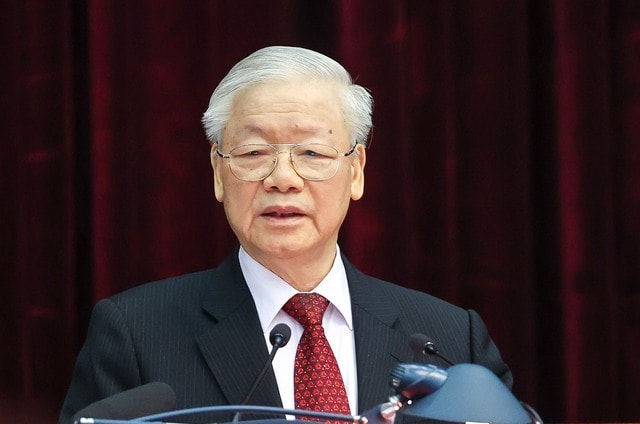 |
| General Secretary Nguyen Phu Trong delivered the opening speech at the Conference - Photo: VGP |
Dear comrades,
In preparation for this Central Conference, the Politburo and the Secretariat promptly established steering committees to research, summarize, and develop reports and projects on the above-mentioned contents to report to the Politburo for discussion, comments, and submission to the Central Committee for consideration and decision. The steering committees closely followed the Party Platform, the State Constitution, and the Resolution of the 13th National Party Congress, the resolutions, directives, and conclusions of the Central Executive Committee, the Politburo, and the Secretariat, as well as the practical situation of the country, the region, and the world to conduct summaries, research, and develop reports, projects, submissions, and draft resolutions to submit to the Central Committee. The Politburo and the Secretariat also seriously reviewed the leadership and direction of the Politburo and the Secretariat in 2021 in conjunction with the implementation of the Conclusion of the 4th Central Conference of the 13th tenure on Party building and rectification and the political system to develop reports to submit to this Central Conference.
According to the Working Regulations, the Party Central Office has sent documents for your review in advance. Next, I would like to make a few comments on some issues related to the content of the reports and projects, which are suggestive in nature and I hope that you will pay attention to them during the discussion, consideration and decision-making process.
1. AboutSummary of 10 years of implementing Resolution of the 6th Central Conference, 11th term, on continuing to innovate land policies and laws
We all know that land is a special national asset, a basic means of production, an extremely valuable resource, a source of life for the people and a great resource of the country, owned by the entire people, represented by the State and managed in a unified manner. I have repeatedly repeated Karl Marx's saying: "Labor is the father, land is the mother of material wealth"; many people get rich thanks to land, but there are also many people who become poor because of land, even go to jail because of land, lose their father-son and brotherly love because of land... It is no coincidence that in the past, more than 70% of the denunciations and complaints were related to the land sector. Therefore, summarizing the implementation of the Resolution of the 6th Central Conference of the 11th tenure on land this time is a necessary requirement to implement the Resolution of the 13th National Party Congress, continue to innovate and perfect institutions and policies, promptly remove obstacles in land management and use, ensure harmony of interests of the State, people and investors, create new resources and motivation to strive to become a developed country by 2030.modern industrialized country with upper middle income; and by 2045 becomedeveloped, high-income countries.
This is a very large, fundamental, extremely complex, sensitive, especially important and crucial field for the stability and sustainable development of the country, and there are still many different opinions. When discussing and evaluating the situation and causes, we need to grasp the dialectical materialist method, the basic viewpoints and principles that have been identified inPlatformof the Party andConstitutionof the State to comprehensively and objectively analyze the results of the implementation of the policies and measures stated in the Resolution 6 of the 11th Central Committee and the land law; clearly indicate how the content of the Resolution has been institutionalized? Which points have been institutionalized correctly, which points have not been institutionalized correctly? Which important viewpoints and requirements of the Resolution have not been institutionalized or have not been seriously implemented? What is the implementation situation in reality? What policies and guidelines need to be supplemented, amended, and adjusted?...
At the same time as affirming the positive changes and outstanding results achieved in the past 10 years, it is also necessary to frankly point out the limitations, weaknesses and causes. Focus on clarifying: Why have land resources not been fully exploited to become an important internal force serving socio-economic development? Why is land use still wasteful and ineffective in many places; corruption and negativity related to land being slowly pushed back, even increasing? Why are the number of complaints and denunciations related to land still numerous and complicated? Why is the real estate market developing unhealthily, unsustainably and still fraught with many risks?... What are the causes of the viewpoints, guidelines and policies stated in the Resolution and the shortcomings of the 2013 Land Law? What are the reasons for the inadequate sub-law regulations; too many overlapping and contradictory regulations? And what are the reasons for the weak implementation of state management agencies; due to inadequate awareness and lack of strict compliance with the law?...
On that basis, propose policies and orientations to continue innovating and perfecting institutions and policies on land; pay attention to issues that are currently stuck or causing public concern and issues that still have different opinions. For example: How to fully and correctly perceive the entire people's ownership of land with the State as the owner's representative; the authority and responsibility of the State in its position and role as the owner's representative, performing the functions and tasks of unified state management of land and as the land user. Policies and guidelines on land, especially on land use planning and planning; on land allocation and leasing; on support, compensation, resettlement, land recovery; on land finance, land price determination and real estate market development; on the management and use regime of agricultural land, land originating from state-owned farms and forestry farms, and land for religions and beliefs; How should state management of land... continue to be innovated and improved to be correct, close to reality and meet development requirements in the new period?...
2. AboutSummary of 15 years of implementing Resolution of the 7th Central Conference, Session X, on agriculture, farmers, and rural areas
Implementing the direction of the Politburo and the Secretariat, over the past time, the Central Steering Committee has summarized 15 years of implementing the Resolution 7 of the 10th Central Committee on agriculture, farmers and rural areas in a serious, methodical, elaborate and scientific manner, with the participation and close coordination, with a high sense of responsibility of the Central and local departments, ministries, branches, experts, scientists and managers; inheriting the results of summarizing the Central Resolutions on land policies and laws and collective economy.The summary report presented to the Central Committee at this Conference objectively and comprehensively assessed the implementation of the Resolution of the 10th Central Committee, Session 7, pointing out the great, comprehensive and impressive results and achievements that have been achieved; at the same time, it also frankly identified the remaining limitations and weaknesses and their causes. From there, it proposed viewpoints, goals, tasks and main solutions to continue innovation until 2030, with a vision to 2045; and recommended that the Central Committee consider issuing a new Resolution to continue leading and directing innovation and development of agriculture, farmers and rural areas in the new period.
I would like to request that the comrades attending today's Conference focus on studying, discussing, and creating a high level of consensus on the implementation of the Resolution of the 10th Central Committee, Session 7, on agriculture, farmers, and rural areas, and the viewpoints, goals, tasks, and solutions proposed to meet the development requirements of the new period - until 2030, with a vision to 2045; continue to promote the results, achievements, and successful lessons learned; thoroughly overcome the remaining limitations and weaknesses, and the causes drawn from the summary process are: Agricultural development is still unsustainable, the growth rate tends to decrease, production organization still mainly relies on small households, and there is a lack of linkage in production and business; the collective economy and cooperatives are slow to develop. Research, application of science and technology, innovation, and high-quality human resources have not become the main driving force to create breakthroughs in development. Many varieties of plants, livestock, and input materials still depend on imports..Attracting investment for industrial and service development in rural areas faces many difficulties. Mechanization is not yet synchronous, mechanical industry and agricultural processing industry are developing slowly. Vocational training, job creation and restructuring of rural labor have not met requirements. Rural labor tends to age, labor productivity is still low. The income of most farmers is not high, the gap with urban areas and between regions is still large; the rate of poor households in rural areas is still high, especially in remote areas, ethnic minority areas. New rural construction is not uniform, many places have not paid due attention to production development, creating livelihoods for people; building cultural life, protecting the environment; the level of achieving new rural criteria in difficult areas is still low; many social problems arise, causing frustration among the people; rural environmental pollution is increasing in many localities. Capacity to adapt to climate change is still weak; Disaster and disease prevention have not met requirements.
3. On summarizing 20 years of implementing the Resolution of the 5th Central Conference, Session IX, continuing to innovate, develop and improve the efficiency of the collective economy
The Party Platform, the State Constitution and the Party Congress Resolutions all affirm the important position and role ofcollective economy; determining that the development of the collective economy together with the state economy is increasingly becoming a solid foundation of the national economy. In order to innovate and improve the efficiency of the collective economy in accordance with the socialist-oriented market economy, overcoming the limitations and weaknesses of the old-style cooperative model, on March 18, 2002, the 5th Central Conference of the 9th term issued Resolution No. 13-NQ/TWon continuing to innovate, develop and improve the efficiency of the collective economy.
The summary report of 20 years (2002 - 2022) of the implementation of the Resolution of the 9th Central Committee, Session V, has been elaborately and seriously prepared on the basis of the summary reports and thematic reports of ministries, branches, central agencies and 63 provincial and municipal Party Committees directly under the Central Committee; research and survey results of the Steering Committee in a number of localities; opinions at 12 expert seminars, 3 national cadre conferences summarizing 20 years of implementing the Resolution, and the advisory report of the Central Theoretical Council.
The summary shows that after 20 years of implementing the Resolution of the 9th Central Committee, the collective economic sector of our country has had positive changes. Awareness in the political system and among the people about the development of collective economy and cooperatives has been raised. The legal system, mechanisms and policies have been built with attention, suitable for each stage of development. Cooperatives have basically completed the transformation according to the provisions of law. Number of cooperatives and cooperative unionsnew establishmentsignificantly increased; many cooperatives and cooperative unions have developed more diversely in terms of occupations, scale and level, better supporting the member economy, creating jobs and regular income for workers. Cooperative groups with a compact organizational structure, simple but practical activities, meet the flexible and short-term association needs of the people. The association between cooperatives with each other and with other economic organizations has initially developed. The collective economic sector has basically overcome the prolonged weakness, contributing to the construction of new rural areas, ensuring social security, order and safety, gradually affirming its position and fundamental role in the national economy.
However, the collective economic sector of our country has not yet reached the level of development as set out in the goals and requirements. Innovation, development and improvement of collective economic efficiency still face many difficulties. The growth rate and contribution to the country's GDP of the collective economic sector are still low and tend to decrease. Cooperatives develop unevenly between regions and areas; between the agricultural and non-agricultural sectors. Cooperative activities have not yet become a movement to attract members. Although the number of cooperatives has increased, the numbermemberThe average income of cooperatives tends to decrease; members participating in cooperative activities is still formal, not fully exercising their rights and obligations in the cooperative. The internal capacity of cooperatives is still weak, and operational efficiency is not high. Most cooperative groups and cooperatives are small in scale, with little capital, narrow in scope of operation, and low in benefits for members; the internal connectivity of cooperatives is very weak; joint ventures and linkages between cooperatives and between cooperatives and other economic organizations are not popular. The number of cooperative unions is small; the organization and operation of cooperative groups is unstable; many transformed cooperatives are still formal, without any real change in quality.
We request that the Central Committee comrades and the comrades attending the conference, starting from reality, discuss and evaluate objectively and scientifically the results and achievements that have been achieved; at the same time, deeply analyze the remaining limitations and weaknesses and their causes. From there, closely following the Resolution of the 13th National Party Congress and the country's reality, focus on discussing and clarifying, creating high unity within the entire Party and people on the goals, viewpoints, guiding thoughts and the major tasks and solutions that need to be thoroughly grasped and implemented so that the collective economy can develop more strongly, correctly and healthily, truly becoming an important economic component of the socialist-oriented market economy in our country.
4. On the Project on building grassroots party organizations and party members
For a long time, the Central Executive Committee, the Politburo, and the Secretariat of all terms have paid great attention to and focused on the leadership and direction work of consolidating and building grassroots party organizations and improving the quality of party members in accordance with the spirit that President Ho Chi Minh repeatedly emphasized:"To lead the revolution, the Party must be strong. A strong Party is due to good Party cells; a good Party cell is due to good Party members."The movement to build "four-good party organizations", "four-good party cells", "four-good party members" has been launched and maintained regularly in many places. However, besides the results and achievements, the leadership capacity and fighting strength of many grassroots party organizations are still weak, even losing their fighting strength; they are not strong enough to detect and solve complex problems occurring at the grassroots, especially in places with complicated political security, social order and safety situations. Political and ideological education, training of political mettle and revolutionary ethics for cadres and party members is not regular, and is even taken lightly in some places. Many cadres and party members are not politically steadfast; their pioneering and exemplary roles are limited; their spirit of self-criticism and criticism is weak. The capacity and qualifications of some party committee members, party committee secretaries, cadres and party members do not meet the requirements of the task; Leadership methods, working styles, contents, and living regimes of Party committees, Party chapters, and Party cells are slow to innovate. In many places, Party cells have not yet demonstrated their role as political cores, pioneers, and role models, so the people do not really trust them. There are even some cadres and Party members who have degraded in political ideology, ethics, and lifestyle, "self-evolved", "self-transformed", violated Party principles and discipline, and violated the law, causing people's trust in the Party to decline.
Therefore, implementing the Resolution of the 13th Party Congress on this issue, the Politburo and the Secretariat directed the summary of the implementation of Resolution No. 22-NQ/TW of the 10th Central Executive Committee, Conclusion No. 38-KL/TW of the 12th Politburo and the drafting of a Resolution on strengthening and consolidating grassroots party organizations and improving the quality of party members in the new situation to be submitted to the Central Committee for consideration and decision at this Conference.
Projecthas mentioned objectively and comprehensively the implementation of the Resolution and Conclusion, pointed out the main results achieved; the remaining limitations and weaknesses and clearly analyzed the causes. From there, it proposed viewpoints, goals, tasks and main solutions to continue to innovate, strengthen the building of grassroots party organizations and improve the quality of party members in the new situation. I request that comrades study carefully, discuss democratically and frankly, create high consensus on the issues raised in the Report, so that after this Central Conference we will have a new, substantial, strong and effective change and progress, aiming to further improve the quality, strength and combativeness of our Party in accordance with Lenin's ideology."Better less but better"; "we don't need party members in name only, even if they're given for free!".
5. On the Project to establish a Provincial Steering Committee on preventing and combating corruption and negativity
Implementing the 2022 Work Program and the Conclusion at the 21st meeting of the Central Steering Committee on preventing and combating corruption and negativity, and the Conclusion of the Politburo on continuing to strengthen the Party's leadership in this work, the Politburo assigned the Central Internal Affairs Commission to preside over and coordinate with relevant agencies to urgently and seriously research and developProjectEstablish a provincial Steering Committee on anti-corruption and negativity.
Projectinheriting the results of the 5-year review of the implementation of Conclusion No. 10-KL/TW of the 12th Politburo on continuing to implement Resolution No. 3 of the 10th Central Committee on strengthening the Party's leadership in the work of preventing and combating corruption and waste; 5-year review of the implementation of Directive No. 50-CT/TW of the 11th Politburo on strengthening the Party's leadership in detecting and handling corruption cases; summarizing the work of preventing and combating corruption in the period of 2013 - 2020; and starting from the requirements for the work of preventing and combating corruption and negativity in the new situation. The Central Internal Affairs Committee organized a workshop to collect comments from experts and officials with practical experience in preventing and combating corruption and negativity; sent comments to departments, ministries, branches, localities and members of the Central Steering Committee on preventing and combating corruption and negativity to absorb and complete the Project. Through constructive commentsProject, all 63/63 provincial and municipal Party Committees agreed with the policy of establishing a Provincial Steering Committee on preventing and combating corruption and negativity.
Projecthas presented fully, correctly, with theoretical and practical basis the necessity, basis and principles for establishing the Provincial Steering Committee; functions, tasks, powers, organizational structure, working relationship of the Provincial Steering Committee on preventing and combating corruption and negativity, and has also drafted related documents. It is requested that the Central Committee study, consider and decide on the recommendations and proposals stated in the Politburo's Submission, especially on the policy of establishingProvincial Steering Committee on anti-corruption and negativityto contribute to strengthening the leadership and direction of the drastic and synchronous implementation from the Central to local levels in the work of preventing and combating corruption and negativity of our entire Party, people and army, in the spirit I have said many times: "Unanimity from top to bottom, clarity from top to bottom!".
6. On reviewing the leadership and direction of the Politburo and Secretariat in 2021 in conjunction with implementing the Conclusion of the 4th Central Conference of the 13th tenure on Party building and rectification and the political system
Implementing the Working Regulations of the 13th Central Executive Committee, Politburo and Secretariat, in January 2022, the Politburo and Secretariat spent 3 days reviewing, self-criticizing and criticizing the leadership and direction of the collective and individual members of the Politburo and Secretariat in 2021 in conjunction with the implementation of the Conclusion of the 4th Central Conference of the 13th tenure on building and rectifying the Party and a clean and strong political system.
This review, self-criticism and criticism were carried out seriously, systematically, according to regulations and procedures in a reasonable step-by-step manner. All review reports were prepared in accordance with regulations and instructions. The review atmosphere was in the spirit of serious, frank, democratic, united and sincere self-criticism and criticism. The comrades who received comments accepted them seriously and receptively, considering this a valuable opportunity to learn and share with each other. During the review process, each member of the Politburo and Secretariat related to personal responsibility for the assigned field, clearly saw the strengths to promote, and recognized the shortcomings and limitations to overcome.
Through collective and individual reviews, the Politburo and the Secretariat found that: In 2021, in the context of many difficulties and challenges, the Politburo and the Secretariat were always united, calm, steadfast, and clear-headed in the face of difficulties and challenges, with many innovations and creativity, closely following viewpoints, policies, and guidelines, concretizing important contents of the Resolution of the 13th National Party Congress, having made correct, timely, and practical decisions to lead and direct the entire Party, people, and army to organize and implement, achieving important and quite comprehensive results, with outstanding marks, recognized by cadres, party members, and people, and highly appreciated by international friends.
However, the leadership and direction of the Politburo and the Secretariat also have some limitations and shortcomings. The work of strategic forecasting, policy planning, summarizing practices, and theoretical research has sometimes failed to promptly meet the requirements and demands of the new situation. In disease prevention and control, there have been times and places where there has been negligence, subjectivity, passivity, confusion, or rigidity, and a lack of unity and synchronization in leadership and direction in handling specific and sudden situations. There are also limitations and shortcomings in research, forecasting, and analysis of the situation to systematically and promptly develop and implement short-term and long-term plans to ensure both disease prevention and control and socio-economic development, ensuring normal activities.
The results, achievements as well as specific limitations and weaknesses have been fully stated in the Politburo's Report to the Party Central Committee members. It is recommended that the Central Committee, with the spirit of looking straight at the truth and correctly assessing the truth, carefully consider and evaluate the advantages, limitations and shortcomings in the leadership and direction of the Politburo and the Secretariat in conjunction with the implementation of the Conclusion of the 4th Central Committee, Session XIII, in all fields. In particular, it is necessary to clearly point out the causes, draw lessons and propose positive solutions to overcome them in the coming time.
Dear comrades,
The contents presented at this Central Conference are very big, very difficult and very important issues for the successful implementation of the Resolution of the 13th National Party Congress in key areas such as: Promoting the country's socio-economic development to 2030, with a vision to 2045; strengthening the building and rectification of the Party and the political system to be increasingly clean and strong from the root, from the grassroots, to meet the increasingly high requirements of the revolution in the new period;... It is recommended that the Central Committee promote a high sense of responsibility, focus on research, thorough discussion, give opinions to complete and consider, and decide at the end of the session.
In that spirit, I hereby declare open the 5th Conference of the 13th Party Central Committee. I wish our Conference great success!
Thank you very much!

